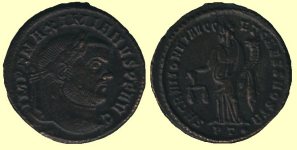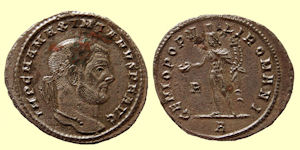
Maximianus"Herculius" 286 - 305 A.D. (First reign) 307 - 308 (Second reign) 310 (Usurpation)
By clicking on the pictures you'll be linked to a more complete description of the coin. At the bottom of this page there is a more elaborate biography of the emperor.
 |
Obverse: IMP C MAXIMIANVS PF AVG |
| Reverse: SACRA MONET AVGG ET CAESS NOSTR | |
|
Fieldmarks: -
|
|
| Exergue: PT |
 |
Obverse: IMP C MA MAXIMIANVS PF AVG |
| Reverse: GENIO POPVLI ROMANI | |
|
Fieldmarks: R in the left field
|
|
| Exergue: A |
Maximianus"Herculius" 286 - 305 A.D. (First reign) 307 - 308 (Second reign) 310 (Usurpation)
Maximianus was born near Sirmium at around 250 AD to a poor shopkeeper's family. He was married to a woman called Eutropia and had three children, Maxentius and Fausta and an older daughter, Theodora, who might have been a step daughter. Maximianus rose through the ranks of the army and served with distinction under emperor Aurelian and during the reign of Probus he became respected as a battle hardened veteran general with a rough character. He was a friend of Diocletian who, also born near Sirmium, had a military career very similar to his own. Soon after his ascension Diocletian started to completely reform the current Roman governmental, military and economic structure. Diocletian had come to the conclusion that the empire was simply to big to be ruled by just one man. To solve this problem he declared his friend Maximianus as Caesar in November 285 AD and granted him control over the western provinces. Diocletian urgently needed to deal with the problems on the Danubian borders in the east and needed someone trustworthy in Rome to take care of government. Not having a son, it was a natural choice to pick one of his trusted military comrades.
Diocletian quickly moved to the east to deal with the troubles along the Danubian borders and left Maximianus to deal with the troubles that had arisen in Gaul. Bagaudae or robber bands, made up of peasants driven out of their homes by invading barbarians and army deserters, had risen up against Roman authority. It was a short lived revolt which by the spring of 286 AD was crushed by Maximianus following several minor engagements. Shortly after, his troops, prompted by Diocletian, hailed Maximianus as Augustus on the 1st of April 286. Diocletian however remained the senior ruler, possessing a veto over any edicts made by Maximianus. At his accession Maximianus adopted the names Marcus Aurelius Valerius Maximianus (he also declared himself the son of Hercules and took the title of Herculius and was thus also known as Maximianus Herculius). No sooner was he declared emperor or he had to deal with invasions by the Alemanni and the Burgundians in Upper Germany. This wasn't his only problem, in the winter of 286/7 AD Carausius, the commander of the North Sea fleet who had been appointed to deal with a pirate problem, revolted and declared himself emperor. Britannia and the northern part of Gaul sided with the usurper. On his own Maximianus was unable to repress him. Maximianus and his praetorian prefect Constantius attempted to deal with both the ongoing problem of Carausius and the continued Germanic incursions of his realm but attempts to set across to Britannia and oust the usurper met with heavy defeat. And so Carausius had to be grudgingly accepted as co-emperor, at least for the time being so Maximianus could concentrate on beating back the Germanic invasions across the Rhine.
When things got more and more under control Diocletian took another step in changing the government. In 293 AD he declared that each emperor should adopt a son who would rule as his junior emperor. Maximianus elevated his praetorian prefect Constantius Chlorus (Constantius the pale) to this position in the west and Galerius was elected by Diocletian in the east. Both men where chosen on their merits and not on their social states or family relations. In the future this would ensure that each emperor would adopt the best man for the job as their son and co-augustus and that no succession issues would arise since an heir apparent would be ready to take over at any time. This so-called Tetrarchy didn't split the empire in an eastern and western part, but allowed it to be ruled by four man who, together, could easily control all its borders and deal with any problems that might arise. Maximianus was allotted control of Italy, Spain and Africa. Maximianus chose his capital to be Mediolanum Constantius was given responsibility for the north west of the empire and was left to reconquer the breakaway empire of Britannia (which he did in 296). Maximianus guarded the German frontier on the Rhine while Constantius was dealing with Carausius and in 297 Maximianus moved eastwards to the Danubian provinces where he defeated the Carpi. After this, still in the same year, Maximianus was called to north Africa where a nomadic Mauretanian tribe, known as the Quinquegentiani were causing trouble. The situation back under control, Maximianus then set out to reorganize and strengthen the defenses of the entire frontier from Mauretania to Africa.
After a serious illness, Diocletian abdicated (a move no other emperor had ever made) from the throne on the 1st of May 305 AD, he compelled a reluctant Maximianus to do the same and even made him swear an oath at the temple of Capitoline Jupiter to carry out the terms of the abdication. The abdication of the two Augusti had now transferred their power to Constantius Chlorus and Galerius, who in turn promoted Severus II and Maximinus II Daia to their places as Caesars. This arrangement however totally ignored Maximianus' son Maxentius, who was not happy and started a rebellion at Rome on the 28th of October 306 AD. This rebellion was inspired by Galerius' decision to tax the citizens of Rome, who had been exempt from taxes ever since the days of the Republic. Maxentius, with the senate's approval, then immediately sent for his father to come out of retirement and rule with him as co-Augustus Maximianus was all too glad to come back and assumed the rank of Augustus again in February 307 AD. A series of battles followed where Galerius and his Caesar Severus II tried to defeat Maxentius but he managed to fend of these attacks and killed Severus II. Then Maxentius strengthened his position by marrying his daughter Fausta to the son of Constantius Chlorus, Constantine who had become Caesar of the west when his father died and Augustus of the west when Severus II was killed. In a weird twist of events Maximianus then turned on his own son Maxentius in April 308. Unfortunately for him he failed to win over his son's soldiers and he was forced to withdraw back to Constantine in Gaul. Because of the escalating nature of the internal conflicts, a conference for all Augusti and Caesars was called at Carnuntum in October 308 by Galerius. During this conference, for which Diocletian came out of retirement. Maxentius was declared an enemy of the people and Maximianus once again was forced to abdicate, he reluctantly retired to the court of Constantine in Gaul.
But Maximianus ambitions hadn't stopped and he pronounced himself emperor for the third time in 310 AD, while his host Constantine was campaigning against the Germans on the Rhine frontier. Constantine however reacted swiftly and defeated Maximianus who was forced to flee southward, to Massilia. Constantine laid siege to the city and forced its garrison to surrender. Maximianus was handed over and by Constantine's account, who really didn't want to kill his aging father-in-law, he committed suicide but Maximianus may well have been executed.
For this biography I've used the texts from the following websites:
http://www.imperiumromanum.com/
http://www.roman-emperors.org/
http://www.roman-empire.net/
And from: Gibbon's Decline and fall of the Roman empire.